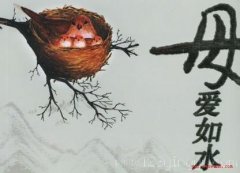散文英译汉佳作赏析:我父亲的音乐
编辑:高中作文网 阅读 次
My Father's Music
我父亲的音乐
by Wayne Kalyn
韦恩•凯林
I remember the day Dad first lugged the heavy accordion up our front stoop, taxing his small frame. He gathered my mother and me in the living room and opened the case as if it were a treasure chest. "Here it is," he said. "Once you learn to play, it'll stay with you for life."
记得有一天,身材瘦小的父亲背着一架沉重的手风琴,费力地走到前门廊。他把妈妈和我叫进厅里,打开了那只盒子,好象那是一个百宝箱似的。“就这个,”他说,“你一旦学会,它将伴随你一生。”
If my thin smile didn't match his full-fledged grin, it was because I had prayed for a guitar or a piano. For the next two weeks, the accordion was stored in the hall closet. Then one evening Dad announced that I would start lessons the following week. In disbelief I shot my eyes toward Mom for support. The firm set of her jaw told me I was out of luck.
如果说我勉强的微笑与他发自内心的笑容不和谐的话,那是因为我一直想要一把吉他或一架钢琴。随后的两个星期,那架手风琴一直放在大厅的橱子里。一天晚上,爸爸宣布下周我开始上琴课。疑惑中,我把视线急忙投向妈妈求助。她紧绷的下巴告诉我:我倒运了。
Spending $300 for an accordion and $5 per lesson was out of character for my father. He was practical always - something he learned growing up on a Pennsylvania farm. Clothes, heat and sometimes even food were scarce.
花300元买一架手风琴,每次上课再花3美元,这可不像父亲的作风。他一直是很实际的——这是他在宾夕法尼亚农场成长过程中学来的。那时候,衣服、暖气,有时甚至连食物都短缺。
Dad was a supervisor in a company that serviced jet engines. Weekends, he tinkered in the cellar, turning scraps of plywood into a utility cabinet or fixing a broken toy with spare parts. Quiet and shy, he was never more comfortable than when at his workbench.
爸爸是一家为喷气式飞机引擎提供服务的公司的主管。周末,他在地下室里修修补补,把胶合板的边角料做成一个实用的小柜子,或者用一些零件把坏了的玩具修好。他不喜张扬,不爱说话。最让他感到舒服的,莫过于在工作台旁边。
Only music carried Dad away from his world of tools and projects. On a Sunday drive, he turned the radio on immediately. At red lights, I'd notice his foot tapping in time. He seemed to hang on every note.
只有音乐会让爸爸远离他的工具和计划的世界。一个星期天驾车外出,一上车他就打开了收音机。遇到红灯时,我注意到他的脚在打着拍子,似乎能跟得上每一个节拍。
Still, I wasn't prepared when, rummaging in a closet, I found a case that looked to me like a tiny guitar's. Opening it, I saw the polished glow of a beautiful violin. "It's your father's," Mom said. "His parents bought it for him. I guess he got too busy on the farm to ever learn to play it." I tried to imagine Dad's rough hands on this delicate instrument - and couldn't.
然而,我还是没有思想准备,那是我在橱子里翻找东西时,发现一只像是装小吉它的盒子。打开一看,是一把锃亮的、漂亮的小提琴。“那是你爸爸的,”妈妈说。“他父母给他买的。我想他在农场里太忙了,没有时间学。”我试图想象爸爸粗糙的双手放在这精致的乐器上的情景——无法想象。
Shortly after, my lessons began with Mr. Zelli. On my first day, with straps straining my shoulders, I felt clumsy in every way. "How did he do?" my father asked when it was over. "Fine for the first lesson," said Mr. Zelli. Dad glowed with hope.
不久,泽利先生开始教我拉手风琴。第一天,手风琴背带压着我的肩膀,我感到浑身不自在。“他学得怎么样?”结束时,父亲问。“第一堂课,这已经很不错。”泽利先生说。爸爸眼中闪着希望的光芒。
I was ordered to practice half an hour every day, and every day I tried to get out of it. My future seemed to be outside playing ball, not in the house mastering songs I would soon forget. But my parents hounded me to practice.
爸爸命令我每天练半个小时,可每天我都想赖掉。我的将来似乎应在户外打球,而不是在屋内练那些很快就会忘掉的曲子。然而父母不断地督促我练习。




